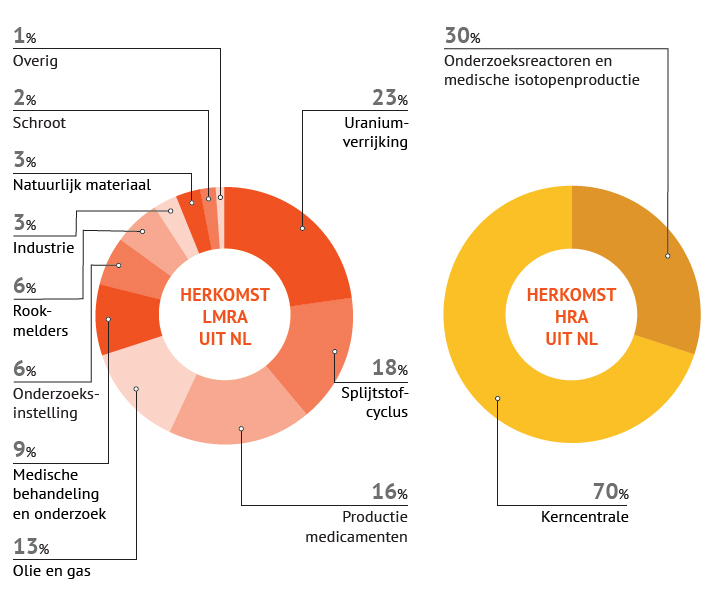Because relatively little radioactive waste is produced in the Netherlands, and due to the specialist knowledge required, in 1982 a decision was taken to set up a single recognised organisation to manage all the waste at a single central location in the Netherlands: COVRA.
COVRA is permanently responsible for handling Dutch radioactive waste with a view to protecting people and the environment. All radioactive waste is safely stored by COVRA for at least one hundred years in buildings especially designed for this purpose. The waste is isolated at a central location where it can be controlled, to guarantee safety for a prolonged period. Ultimately, the waste must be stored in a repository for deep geological disposal. This ensures that even after thousands of years, the waste is still outside our living environment.
Radioactive waste management distinguishes between two types of waste: low and intermediate-level radioactive waste on one hand and high-level radioactive waste on the other.
Low-level and intermediate-level radioactive waste
Low and intermediate-level radioactive waste includes: gloves, laboratory glassware, clothing, resins, syringes, radiation sources, smoke detectors, plastic foil, pumps and tubes, contaminated scrap metal, animal material from animal testing, liquids, filters and sludge. The dismantlement of laboratories which have worked with radioactive substances, as well as the demolition of nuclear power plants and research reactors also produces radioactive substances. Where low-level and intermediate-level radioactive waste is concerned, concrete casing is sufficient to block the radioactive substances and reduce the radiation.
One special category consists of NORM-waste. NORM stands for “Naturally Occurring Radioactive Material”. This is waste with enhanced natural radioactivity: e.g. certain types of industrial waste such as depleted uranium or waste from the phosphate industry.
High-level radioactive waste
High-level radioactive waste consists of spent nuclear fuel components used as fuel in research reactors, waste from medical isotope production and reprocessing waste from nuclear power plants. The Netherlands has two research reactors, in Petten and Delft, and a nuclear power plant in Borssele. The spent nuclear fuel elements from Borssele are reprocessed in France. Reprocessing entails the separation of components that are still usable from waste products. The waste products are returned to the Netherlands and stored at COVRA. The waste with the largest amount of radioactivity is incorporated into glass blocks. The large amount of activity present in glass blocks gives rise to heat, and the waste therefore has to be cooled. After approximately 100 years this waste stops producing heat. The reprocessing process also gives rise to non-heat generating high-level radioactive waste, which is also returned and stored at COVRA.
